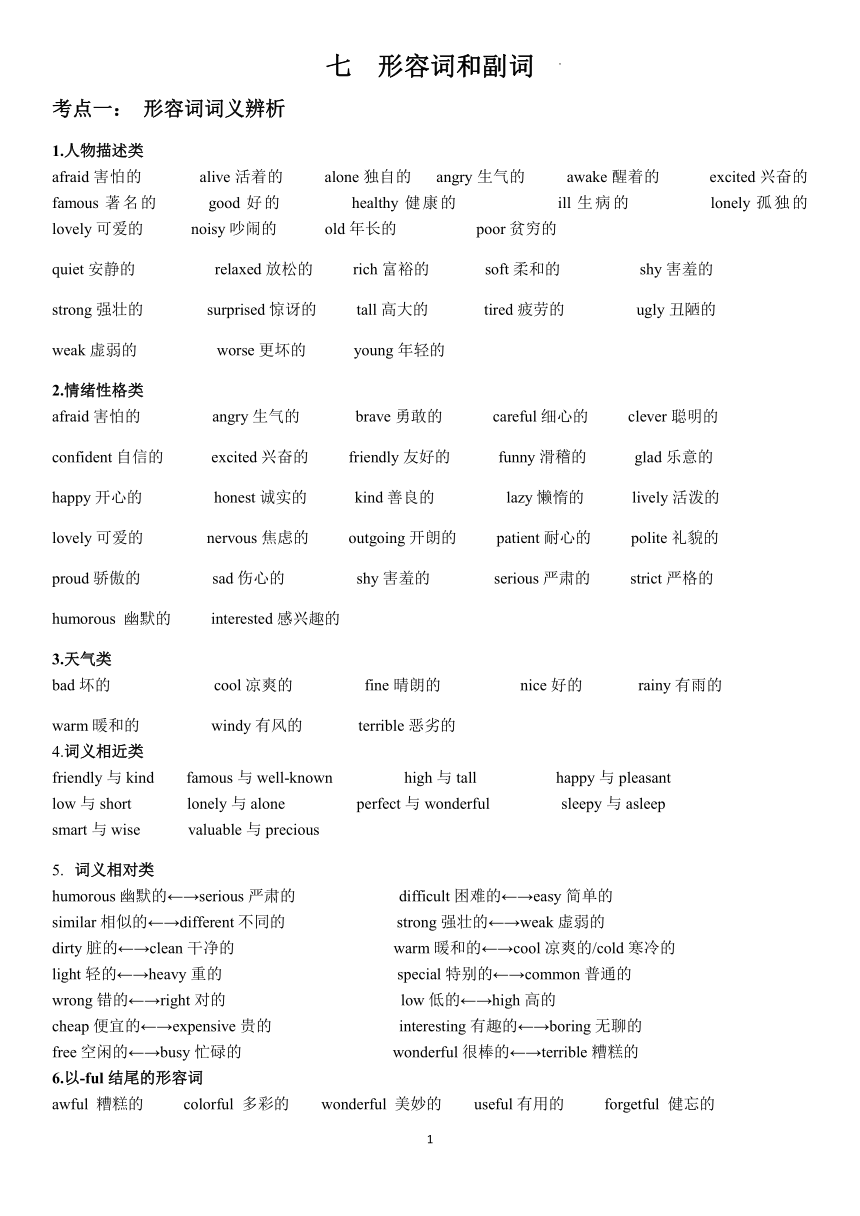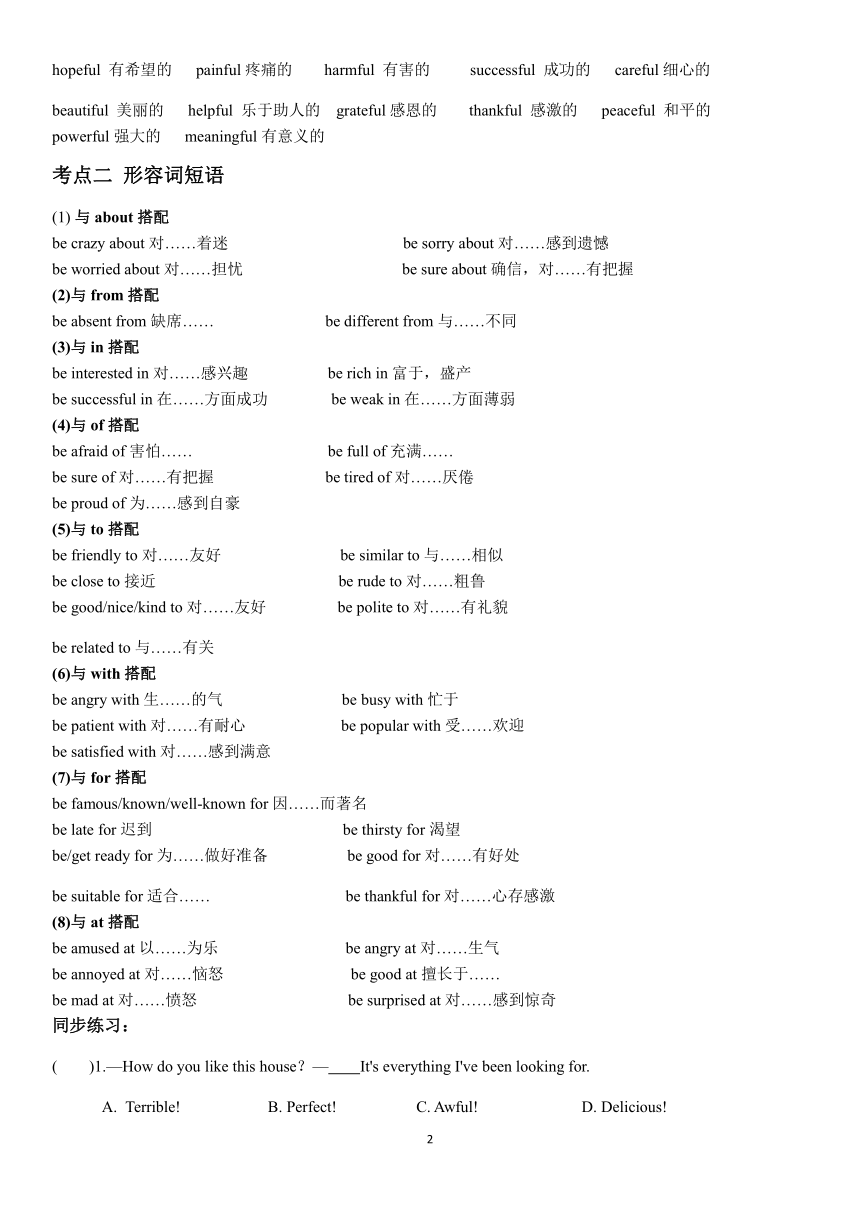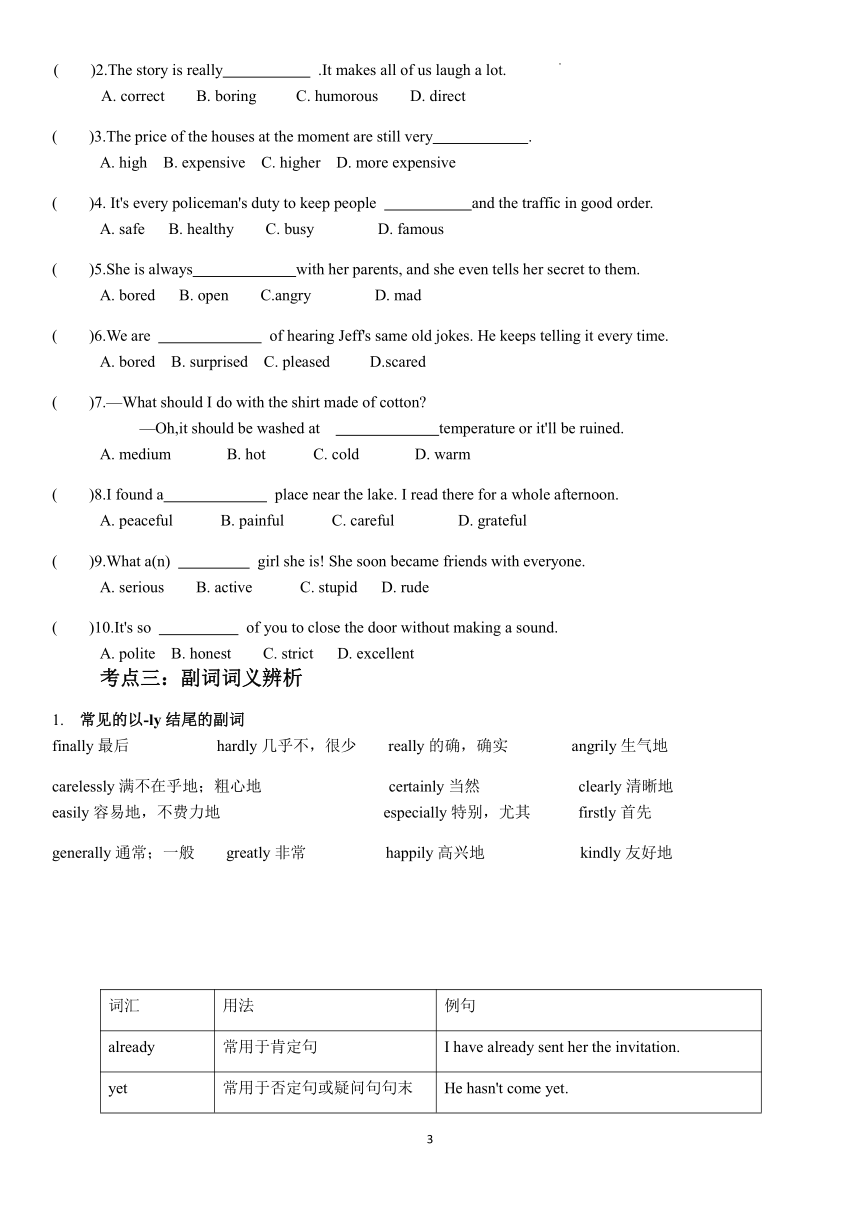2022年中考英语语法专题复习学案形容词和副词
文档属性
| 名称 | 2022年中考英语语法专题复习学案形容词和副词 |  | |
| 格式 | docx | ||
| 文件大小 | 51.3KB | ||
| 资源类型 | 教案 | ||
| 版本资源 | 通用版 | ||
| 科目 | 英语 | ||
| 更新时间 | 2022-04-27 19:57:48 | ||
图片预览



文档简介
七 形容词和副词
考点一: 形容词词义辨析
1.人物描述类
afraid害怕的 alive活着的 alone独自的 angry生气的 awake醒着的 excited兴奋的 famous著名的 good好的 healthy健康的 ill生病的 lonely孤独的 lovely可爱的 noisy吵闹的 old年长的 poor贫穷的
quiet安静的 relaxed放松的 rich富裕的 soft柔和的 shy害羞的
strong强壮的 surprised惊讶的 tall高大的 tired疲劳的 ugly丑陋的
weak虚弱的 worse更坏的 young年轻的
2.情绪性格类
afraid害怕的 angry生气的 brave勇敢的 careful细心的 clever聪明的
confident自信的 excited兴奋的 friendly友好的 funny滑稽的 glad乐意的
happy开心的 honest诚实的 kind善良的 lazy懒惰的 lively活泼的
lovely可爱的 nervous焦虑的 outgoing开朗的 patient耐心的 polite礼貌的
proud骄傲的 sad伤心的 shy害羞的 serious严肃的 strict严格的
humorous 幽默的 interested感兴趣的
3.天气类
bad坏的 cool凉爽的 fine晴朗的 nice好的 rainy有雨的
warm暖和的 windy有风的 terrible恶劣的
4.词义相近类
friendly与kind famous与well-known high与tall happy与pleasant
low与short lonely与alone perfect与wonderful sleepy与asleep
smart与wise valuable与precious
词义相对类
humorous幽默的←→serious严肃的 difficult困难的←→easy简单的
similar相似的←→different不同的 strong强壮的←→weak虚弱的
dirty脏的←→clean干净的 warm暖和的←→cool凉爽的/cold寒冷的
light轻的←→heavy重的 special特别的←→common普通的
wrong错的←→right对的 low低的←→high高的
cheap便宜的←→expensive贵的 interesting有趣的←→boring无聊的
free空闲的←→busy忙碌的 wonderful很棒的←→terrible糟糕的
6.以-ful结尾的形容词
awful 糟糕的 colorful 多彩的 wonderful 美妙的 useful有用的 forgetful 健忘的
hopeful 有希望的 painful疼痛的 harmful 有害的 successful 成功的 careful细心的
beautiful 美丽的 helpful 乐于助人的 grateful感恩的 thankful 感激的 peaceful 和平的
powerful强大的 meaningful有意义的
考点二 形容词短语
与about搭配
be crazy about对……着迷 be sorry about对……感到遗憾
be worried about对……担忧 be sure about确信,对……有把握
(2)与from搭配
be absent from缺席…… be different from与……不同
(3)与in搭配
be interested in对……感兴趣 be rich in富于,盛产
be successful in在……方面成功 be weak in在……方面薄弱
(4)与of搭配
be afraid of害怕…… be full of充满……
be sure of对……有把握 be tired of对……厌倦
be proud of为……感到自豪
(5)与to搭配
be friendly to对……友好 be similar to与……相似
be close to接近 be rude to对……粗鲁
be good/nice/kind to对……友好 be polite to对……有礼貌
be related to与……有关
(6)与with搭配
be angry with生……的气 be busy with忙于
be patient with对……有耐心 be popular with受……欢迎
be satisfied with对……感到满意
(7)与for搭配
be famous/known/well-known for因……而著名
be late for迟到 be thirsty for渴望
be/get ready for为……做好准备 be good for对……有好处
be suitable for适合…… be thankful for对……心存感激
(8)与at搭配
be amused at以……为乐 be angry at对……生气
be annoyed at对……恼怒 be good at擅长于……
be mad at对……愤怒 be surprised at对……感到惊奇
同步练习:
( )1.—How do you like this house?— It's everything I've been looking for.
Terrible! B. Perfect! C. Awful! D. Delicious!
( )2.The story is really .It makes all of us laugh a lot.
A. correct B. boring C. humorous D. direct
( )3.The price of the houses at the moment are still very .
A. high B. expensive C. higher D. more expensive
( )4. It's every policeman's duty to keep people and the traffic in good order.
A. safe B. healthy C. busy D. famous
( )5.She is always with her parents, and she even tells her secret to them.
A. bored B. open C.angry D. mad
( )6.We are of hearing Jeff's same old jokes. He keeps telling it every time.
A. bored B. surprised C. pleased D.scared
( )7.—What should I do with the shirt made of cotton
—Oh,it should be washed at temperature or it'll be ruined.
A. medium B. hot C. cold D. warm
( )8.I found a place near the lake. I read there for a whole afternoon.
A. peaceful B. painful C. careful D. grateful
( )9.What a(n) girl she is! She soon became friends with everyone.
A. serious B. active C. stupid D. rude
( )10.It's so of you to close the door without making a sound.
A. polite B. honest C. strict D. excellent
考点三:副词词义辨析
常见的以 ly结尾的副词
finally最后 hardly几乎不,很少 really的确,确实 angrily生气地
carelessly满不在乎地;粗心地 certainly当然 clearly清晰地
easily容易地,不费力地 especially特别,尤其 firstly首先
generally通常;一般 greatly非常 happily高兴地 kindly友好地
词汇 用法 例句
already 常用于肯定句 I have already sent her the invitation.
yet 常用于否定句或疑问句句末 He hasn't come yet.
still 常用于肯定句或疑问句,表示某事还在进行 It's very cold outside. But they are still working.
luckily幸好,幸运的是 nearly几乎,将近 probably大概,或许 properly正确地,适当地 quickly迅速地,飞快地 quietly安静地 secretly秘密地
slowly缓慢地 smoothly平整地;顺利地 simply简单地;仅仅
2. 易混副词
同步练习:
( )1.I could control my feelings at the moment.The movie reminds me of my childhood.
A. really B. nearly C. slowly D. hardly
( ) 2.—Is dinner ready?—Not .
A. already B. just C. yet D. ever
( )3.—How is your old friend Katie —Oh, she's moved to another city, so I've ____ ever seen her since then. A. clearly B. simply C. nearly D. hardly
( )4.—Are you the last one to go to school today — not. I'm always the first one.
A. Certainly B. Usually C. Generally D. Finally
( )5. —Do you like seeing a movie on your mobile phone
—No. I do that because it makes me uncomfortable.
A.often B. usually C. seldom D. sometimes
( )6. Zhou Feng has learned English for many years, but he can understand the native speakers. A. hardly B. certainly C. always D. almost
( )7.Be careful when you are driving, ______ in a rainstorm like this.
A. seriously B. totally C. especially D. probably
( )8. Please remember not to speak ______in the reading room.
A. loudly B. slowly C. quietly D. quickly
( ) 9. As a friend, she tries to help me in every way, so I trust her_______ .
A. completely B. heavily C. widely D. hardly
( )10. When Judy sees her neighbors passing by, she is kind enough to greet them .
A. heavily B. sadly C. warmly D. freely
考点四:形容词和副词的混合辨析
( )1.How it rained yesterday! We had to cancel our football match
A. heavily B. light C. heavy D. lightly
( )2. is the best way to keep a good relationship with your parents, teachers and got other people around you.
A. Active communicating B. Actively communicating
C. Actively communication D. Active communicate
( )3.They met in 2012 and got married two years later.
A. special B. exact C. hardly D. exactly
( )4.Old Mr. Green doesn't feel _______because some students visit him regularly.
A. sadly B. lively C. lonely D. angrily
( )5.IPads are becoming smaller and lighter. They can be carried very .
A. easy B. easily C. rapid D. rapidly
( )6. Allen always behaves , so many people like him.
A. strangely B. politely C. friendly D. lovely
( )7. Steve isn't as as Kelly. He often makes mistakes in his writing.
A. careful B. easy C. carefully D. easily
( )8.I am really to go to Korea with my family this summer holiday. I can go shopping there.
A. nervous B. nervously C. happy D. happily
考点五:形容词和副词的比较等级
原级的用法
说明人或事物自身的特征、性质或状态时用形容词原级。如:
The flowers in the garden are beautiful.花园里的花很漂亮。
(2)有表示程度的副词very, so, to, enough, quite等修饰时用形容词原级。如:
The boy is too young.这个男孩太小了。
(3)表示两者在某一方面相同或不同时用原级。常见结构如下:
用法及结构 例句
A=B:as+原级+as Teenagers often think they should be allowed to practice their hobbies as much as they want.
A≠B:not+as/so+原级+as I can not type as/so fast as my brother.
倍数:倍数+as+原级+as My room is twice as big as his.
2. 比较级的用法
(1)当有表示程度的副词及短语much, even, still, far, rather, any, a little, a bit, a lot等修饰时,用形容词或副词的比较级。 It is even colder today.今天甚至更冷了。
(2)比较级常见结构:
①两者进行比较时,用形容词/副词比较级,其结构为:“A+动词+比较级+than+B”或“A+动词+more/less+原级+than+B”
如:To have a spirit of doing by yourself is more useful than crying for help.
②有程度副词a little, a bit, a lot, much, even, far等修饰形容词/副词时,该形容词/副词需用比较级形式。如:She is much smarter than I expect.
③表示两者之间进行选择“哪一个更……”时,用句型“Which/Who+动词+比较级, A or B?”。如:Which is nearer to the sun, the moon or the earth?月球和地球哪个离太阳更近?
④表示“两者之间较……的一个”时,常用“the+比较级+of the two”结构。
如:Mary is the thinner of the two girls over there.玛丽是那边两个女孩中较瘦的那一个。
⑤表示“越来越……”时,用“比较级+and+比较级”或“more and more+原级”结构。
如:I think Chinese will be more and more popular in the future.我认为汉语在将来会越来越流行。
⑥表示“越……,越……”时,用“the+比较级, the+比较级”结构。
如:The more difficult the problem is, the more careful we should be.问题越难,我们就应该越仔细。
⑦表示“是……的几倍”时,用“倍数+比较级+than”结构。
如:Your room is three times bigger than mine.
3. 形容词/副词最高级的用法
(1)表示“……中最……之一”时,用“one of+the+形容词最高级+可数名词复数”结构,如:
It's really one of the most amazing things on the earth!这真的是地球上最神奇的事情之一!
(2)三者或三者以上的人或物进行比较时,用形容词/副词最高级。在最高级的句型中,句末常跟一个among,in或of短语来表示范围。形容词最高级前通常加定冠词the,副词最高级前一般不加the。如:
Helen is the youngest person in her family.海伦是她家里年龄最小的。
(3)表示在三者或三者以上的人或物中进行比较时,用“Which/Who+动词+(the)最高级, A, B or C?”。如:Which season do you like best, spring, summer or autumn 你最喜欢哪一个季节,春天、夏天还是秋天?
(4)形容词最高级前加序数词构成“the+序数词+形容词最高级+可数名词单数”,表示“第几最……”。 如:The Yellow River is the second longest river in China. 黄河是中国第二长河。
形容词最高级前有物主代词、指示代词、名词所有格修饰时,此时不能再用定冠词。如:
She is my best friend. 她是我最好的朋友。
4. 形容词和副词比较等级的变化规则
(1)规则变化:
①单音节词和少数双音节词,直接在词尾加 er, est young→younger→youngest
②以不发音的字母e结尾的加 r, st. large→larger→largest
③单音节词和少数双音节词以重读闭音节结尾,且末尾只有一个辅音字母,则双写这个辅音字母,再加 er, est. big→ bigger →biggest .
④以辅音字母加y结尾,变y为i,再加 er, est. happy →happier →happiest.
⑤多音节词和部分双音节词,在原级前加more, the most
important → more important → the most important.
不规则变化:
原级 比较级 最高级
good/well better best
bad/badly worse worst
many/much more most
little less least
far farther/further farthest/furthest
old older/elder oldest/eldest
同步练习:
( )1. The Nile is one of the rivers in the world.
A. long B. longer C. longest D. most longest
( )2. After two years' physical training, he was and healthier.
A. weaker B. longer C. stronger D. shorter
( )3.It's said that the year 2016 is the ever.
A. warm B. warmth C. warmer D. warmest
( )4. Staying with families and friends is one of things in the world.
A. the happiest B. happier C. the happy D. happiest
( )5.The weather is becoming .
A. hotter and hotter B. more hot and hot
C. hoter and hoter D. more and more hot
考点一: 形容词词义辨析
1.人物描述类
afraid害怕的 alive活着的 alone独自的 angry生气的 awake醒着的 excited兴奋的 famous著名的 good好的 healthy健康的 ill生病的 lonely孤独的 lovely可爱的 noisy吵闹的 old年长的 poor贫穷的
quiet安静的 relaxed放松的 rich富裕的 soft柔和的 shy害羞的
strong强壮的 surprised惊讶的 tall高大的 tired疲劳的 ugly丑陋的
weak虚弱的 worse更坏的 young年轻的
2.情绪性格类
afraid害怕的 angry生气的 brave勇敢的 careful细心的 clever聪明的
confident自信的 excited兴奋的 friendly友好的 funny滑稽的 glad乐意的
happy开心的 honest诚实的 kind善良的 lazy懒惰的 lively活泼的
lovely可爱的 nervous焦虑的 outgoing开朗的 patient耐心的 polite礼貌的
proud骄傲的 sad伤心的 shy害羞的 serious严肃的 strict严格的
humorous 幽默的 interested感兴趣的
3.天气类
bad坏的 cool凉爽的 fine晴朗的 nice好的 rainy有雨的
warm暖和的 windy有风的 terrible恶劣的
4.词义相近类
friendly与kind famous与well-known high与tall happy与pleasant
low与short lonely与alone perfect与wonderful sleepy与asleep
smart与wise valuable与precious
词义相对类
humorous幽默的←→serious严肃的 difficult困难的←→easy简单的
similar相似的←→different不同的 strong强壮的←→weak虚弱的
dirty脏的←→clean干净的 warm暖和的←→cool凉爽的/cold寒冷的
light轻的←→heavy重的 special特别的←→common普通的
wrong错的←→right对的 low低的←→high高的
cheap便宜的←→expensive贵的 interesting有趣的←→boring无聊的
free空闲的←→busy忙碌的 wonderful很棒的←→terrible糟糕的
6.以-ful结尾的形容词
awful 糟糕的 colorful 多彩的 wonderful 美妙的 useful有用的 forgetful 健忘的
hopeful 有希望的 painful疼痛的 harmful 有害的 successful 成功的 careful细心的
beautiful 美丽的 helpful 乐于助人的 grateful感恩的 thankful 感激的 peaceful 和平的
powerful强大的 meaningful有意义的
考点二 形容词短语
与about搭配
be crazy about对……着迷 be sorry about对……感到遗憾
be worried about对……担忧 be sure about确信,对……有把握
(2)与from搭配
be absent from缺席…… be different from与……不同
(3)与in搭配
be interested in对……感兴趣 be rich in富于,盛产
be successful in在……方面成功 be weak in在……方面薄弱
(4)与of搭配
be afraid of害怕…… be full of充满……
be sure of对……有把握 be tired of对……厌倦
be proud of为……感到自豪
(5)与to搭配
be friendly to对……友好 be similar to与……相似
be close to接近 be rude to对……粗鲁
be good/nice/kind to对……友好 be polite to对……有礼貌
be related to与……有关
(6)与with搭配
be angry with生……的气 be busy with忙于
be patient with对……有耐心 be popular with受……欢迎
be satisfied with对……感到满意
(7)与for搭配
be famous/known/well-known for因……而著名
be late for迟到 be thirsty for渴望
be/get ready for为……做好准备 be good for对……有好处
be suitable for适合…… be thankful for对……心存感激
(8)与at搭配
be amused at以……为乐 be angry at对……生气
be annoyed at对……恼怒 be good at擅长于……
be mad at对……愤怒 be surprised at对……感到惊奇
同步练习:
( )1.—How do you like this house?— It's everything I've been looking for.
Terrible! B. Perfect! C. Awful! D. Delicious!
( )2.The story is really .It makes all of us laugh a lot.
A. correct B. boring C. humorous D. direct
( )3.The price of the houses at the moment are still very .
A. high B. expensive C. higher D. more expensive
( )4. It's every policeman's duty to keep people and the traffic in good order.
A. safe B. healthy C. busy D. famous
( )5.She is always with her parents, and she even tells her secret to them.
A. bored B. open C.angry D. mad
( )6.We are of hearing Jeff's same old jokes. He keeps telling it every time.
A. bored B. surprised C. pleased D.scared
( )7.—What should I do with the shirt made of cotton
—Oh,it should be washed at temperature or it'll be ruined.
A. medium B. hot C. cold D. warm
( )8.I found a place near the lake. I read there for a whole afternoon.
A. peaceful B. painful C. careful D. grateful
( )9.What a(n) girl she is! She soon became friends with everyone.
A. serious B. active C. stupid D. rude
( )10.It's so of you to close the door without making a sound.
A. polite B. honest C. strict D. excellent
考点三:副词词义辨析
常见的以 ly结尾的副词
finally最后 hardly几乎不,很少 really的确,确实 angrily生气地
carelessly满不在乎地;粗心地 certainly当然 clearly清晰地
easily容易地,不费力地 especially特别,尤其 firstly首先
generally通常;一般 greatly非常 happily高兴地 kindly友好地
词汇 用法 例句
already 常用于肯定句 I have already sent her the invitation.
yet 常用于否定句或疑问句句末 He hasn't come yet.
still 常用于肯定句或疑问句,表示某事还在进行 It's very cold outside. But they are still working.
luckily幸好,幸运的是 nearly几乎,将近 probably大概,或许 properly正确地,适当地 quickly迅速地,飞快地 quietly安静地 secretly秘密地
slowly缓慢地 smoothly平整地;顺利地 simply简单地;仅仅
2. 易混副词
同步练习:
( )1.I could control my feelings at the moment.The movie reminds me of my childhood.
A. really B. nearly C. slowly D. hardly
( ) 2.—Is dinner ready?—Not .
A. already B. just C. yet D. ever
( )3.—How is your old friend Katie —Oh, she's moved to another city, so I've ____ ever seen her since then. A. clearly B. simply C. nearly D. hardly
( )4.—Are you the last one to go to school today — not. I'm always the first one.
A. Certainly B. Usually C. Generally D. Finally
( )5. —Do you like seeing a movie on your mobile phone
—No. I do that because it makes me uncomfortable.
A.often B. usually C. seldom D. sometimes
( )6. Zhou Feng has learned English for many years, but he can understand the native speakers. A. hardly B. certainly C. always D. almost
( )7.Be careful when you are driving, ______ in a rainstorm like this.
A. seriously B. totally C. especially D. probably
( )8. Please remember not to speak ______in the reading room.
A. loudly B. slowly C. quietly D. quickly
( ) 9. As a friend, she tries to help me in every way, so I trust her_______ .
A. completely B. heavily C. widely D. hardly
( )10. When Judy sees her neighbors passing by, she is kind enough to greet them .
A. heavily B. sadly C. warmly D. freely
考点四:形容词和副词的混合辨析
( )1.How it rained yesterday! We had to cancel our football match
A. heavily B. light C. heavy D. lightly
( )2. is the best way to keep a good relationship with your parents, teachers and got other people around you.
A. Active communicating B. Actively communicating
C. Actively communication D. Active communicate
( )3.They met in 2012 and got married two years later.
A. special B. exact C. hardly D. exactly
( )4.Old Mr. Green doesn't feel _______because some students visit him regularly.
A. sadly B. lively C. lonely D. angrily
( )5.IPads are becoming smaller and lighter. They can be carried very .
A. easy B. easily C. rapid D. rapidly
( )6. Allen always behaves , so many people like him.
A. strangely B. politely C. friendly D. lovely
( )7. Steve isn't as as Kelly. He often makes mistakes in his writing.
A. careful B. easy C. carefully D. easily
( )8.I am really to go to Korea with my family this summer holiday. I can go shopping there.
A. nervous B. nervously C. happy D. happily
考点五:形容词和副词的比较等级
原级的用法
说明人或事物自身的特征、性质或状态时用形容词原级。如:
The flowers in the garden are beautiful.花园里的花很漂亮。
(2)有表示程度的副词very, so, to, enough, quite等修饰时用形容词原级。如:
The boy is too young.这个男孩太小了。
(3)表示两者在某一方面相同或不同时用原级。常见结构如下:
用法及结构 例句
A=B:as+原级+as Teenagers often think they should be allowed to practice their hobbies as much as they want.
A≠B:not+as/so+原级+as I can not type as/so fast as my brother.
倍数:倍数+as+原级+as My room is twice as big as his.
2. 比较级的用法
(1)当有表示程度的副词及短语much, even, still, far, rather, any, a little, a bit, a lot等修饰时,用形容词或副词的比较级。 It is even colder today.今天甚至更冷了。
(2)比较级常见结构:
①两者进行比较时,用形容词/副词比较级,其结构为:“A+动词+比较级+than+B”或“A+动词+more/less+原级+than+B”
如:To have a spirit of doing by yourself is more useful than crying for help.
②有程度副词a little, a bit, a lot, much, even, far等修饰形容词/副词时,该形容词/副词需用比较级形式。如:She is much smarter than I expect.
③表示两者之间进行选择“哪一个更……”时,用句型“Which/Who+动词+比较级, A or B?”。如:Which is nearer to the sun, the moon or the earth?月球和地球哪个离太阳更近?
④表示“两者之间较……的一个”时,常用“the+比较级+of the two”结构。
如:Mary is the thinner of the two girls over there.玛丽是那边两个女孩中较瘦的那一个。
⑤表示“越来越……”时,用“比较级+and+比较级”或“more and more+原级”结构。
如:I think Chinese will be more and more popular in the future.我认为汉语在将来会越来越流行。
⑥表示“越……,越……”时,用“the+比较级, the+比较级”结构。
如:The more difficult the problem is, the more careful we should be.问题越难,我们就应该越仔细。
⑦表示“是……的几倍”时,用“倍数+比较级+than”结构。
如:Your room is three times bigger than mine.
3. 形容词/副词最高级的用法
(1)表示“……中最……之一”时,用“one of+the+形容词最高级+可数名词复数”结构,如:
It's really one of the most amazing things on the earth!这真的是地球上最神奇的事情之一!
(2)三者或三者以上的人或物进行比较时,用形容词/副词最高级。在最高级的句型中,句末常跟一个among,in或of短语来表示范围。形容词最高级前通常加定冠词the,副词最高级前一般不加the。如:
Helen is the youngest person in her family.海伦是她家里年龄最小的。
(3)表示在三者或三者以上的人或物中进行比较时,用“Which/Who+动词+(the)最高级, A, B or C?”。如:Which season do you like best, spring, summer or autumn 你最喜欢哪一个季节,春天、夏天还是秋天?
(4)形容词最高级前加序数词构成“the+序数词+形容词最高级+可数名词单数”,表示“第几最……”。 如:The Yellow River is the second longest river in China. 黄河是中国第二长河。
形容词最高级前有物主代词、指示代词、名词所有格修饰时,此时不能再用定冠词。如:
She is my best friend. 她是我最好的朋友。
4. 形容词和副词比较等级的变化规则
(1)规则变化:
①单音节词和少数双音节词,直接在词尾加 er, est young→younger→youngest
②以不发音的字母e结尾的加 r, st. large→larger→largest
③单音节词和少数双音节词以重读闭音节结尾,且末尾只有一个辅音字母,则双写这个辅音字母,再加 er, est. big→ bigger →biggest .
④以辅音字母加y结尾,变y为i,再加 er, est. happy →happier →happiest.
⑤多音节词和部分双音节词,在原级前加more, the most
important → more important → the most important.
不规则变化:
原级 比较级 最高级
good/well better best
bad/badly worse worst
many/much more most
little less least
far farther/further farthest/furthest
old older/elder oldest/eldest
同步练习:
( )1. The Nile is one of the rivers in the world.
A. long B. longer C. longest D. most longest
( )2. After two years' physical training, he was and healthier.
A. weaker B. longer C. stronger D. shorter
( )3.It's said that the year 2016 is the ever.
A. warm B. warmth C. warmer D. warmest
( )4. Staying with families and friends is one of things in the world.
A. the happiest B. happier C. the happy D. happiest
( )5.The weather is becoming .
A. hotter and hotter B. more hot and hot
C. hoter and hoter D. more and more hot
同课章节目录
- 词法
- 名词
- 动词和动词短语
- 动词语态
- 动词时态
- 助动词和情态动词
- 非谓语动词
- 冠词
- 代词
- 数词和量词
- 形容词副词及其比较等级
- 介词和介词短语
- 连词和感叹词
- 构词法
- 相似、相近词比较
- 句法
- 陈述句
- 一般疑问句和否定疑问句
- 特殊疑问句及选择疑问句
- 反意疑问句
- 存在句(There be句型)
- 宾语从句
- 定语从句
- 状语从句
- 主谓一致问题
- 简单句
- 并列句
- 复合句
- 主谓一致
- 主、表语从句
- 名词性从句
- 直接引语和间接引语
- 虚拟语气
- 感叹句
- 强调句
- 倒装句
- 祈使句
- 句子的成分
- 句子的分类
- 题型专区
- 单项选择部分
- 易错题
- 完形填空
- 阅读理解
- 词汇练习
- 听说训练
- 句型转换
- 补全对话
- 短文改错
- 翻译
- 书面表达
- 任务型阅读
- 语法填空
- 其他资料
